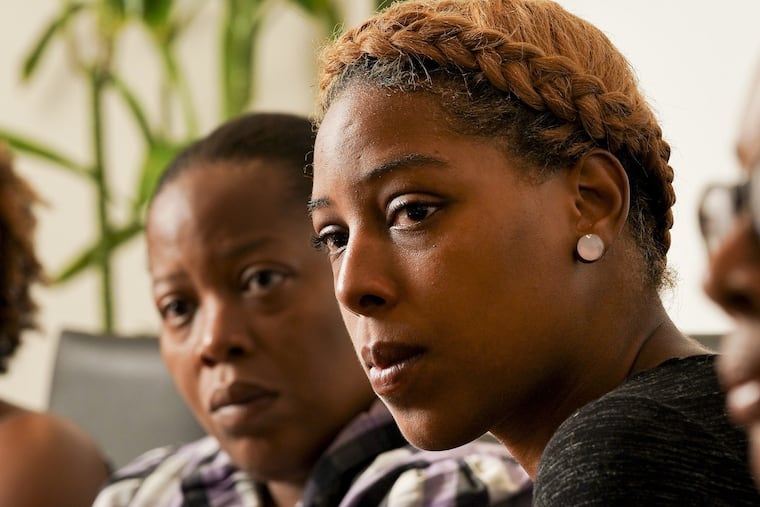A Philly woman killed the boyfriend who’d threatened to put her ‘in the grave.’ A jury found her not guilty.
Lawyer Michael Coard, who represented Letoya Ramseure, had argued that the shooting was justifiable self-defense, based on the so-called Castle Doctrine. A jury acquitted her on all charges.

Devon Roye texted Letoya Ramseure on his way to her house in the city’s Frankford section that July day in 2018. He was coming to get his stuff, he said, and would not come back.
“You touch any of my s—," he wrote, according to text messages read in court, "I guarantee your daughter will be missing two parents, because I’m going to jail and I’m going to put you in the grave.”
An hour later, Roye was dead. Ramseure had shot him five times, then called 911.
And on Thursday, a jury acquitted her on all charges.
Ramseure’s lawyer, Michael Coard, had argued that the shooting was justifiable self-defense, based on the so-called Castle Doctrine.
He said Roye didn’t live at the house or even have a key, and Ramseure had an active protection-from-abuse order, obtained after Roye pistol-whipped and stalked her a year earlier. Roye, he said, “bum-rushed” his way into the house and assaulted Ramseure and her mother before Ramseure went into the bag of items Roye had come to collect and pulled out his gun.
Assistant District Attorney Edgar Jaramillo sought to paint Ramseure as jealous and angry that Roye was leaving and would be staying with another woman. He also pointed to text messages she had sent him, demanding repayment of a $50 debt. He noted that Roye had stayed at Ramseure’s house just the night before. And he questioned why, if Roye had attacked Ramseure and her mother, they did not have visible injuries on the day of the incident.
“This case is so difficult for both sides," he conceded in his closing arguments. "It’s difficult because there’s a young lady involved, and a man who will never tell his side of the story.”
Prosecutors initially charged Ramseure with third-degree murder, but that charge was dismissed at a preliminary hearing. According to Rasheena Carter, Ramseure’s mother, they then offered her a plea deal — but Ramseure was determined to clear her name.
“She’s never been in trouble before,” she said. “She was working as a medical assistant. If she took that, she’d be done for the rest of her life. As it is, she hasn’t been able to get a job.”
Roye, who was six years older than Ramseure, had been with her since she was 13. She testified that he had assaulted her about 30 times over the course of their relationship; three undated photos entered into evidence showed her battered face, one eye bloodied and the other bruised and swollen shut.
Studies of incarcerated women — the fastest-growing segment of the U.S. prison population — have found that most were once victims. It’s estimated that at least 77% of incarcerated women have experienced intimate-partner violence or other forms of physical, emotional or sexual abuse. A study of 60 women at one maximum-security prison found that nearly half described their crimes as responses to physical abuse, acts of self-defense or retaliation.
Ramseure sobbed silently throughout the trial. So did Roye’s mother, Kelley, who previously told The Inquirer she held Ramseure responsible for the murder of her son.
On the witness stand, Ramseure insisted she still loved Roye. The two had continued to see one another despite the ongoing protection-from-abuse order, and the jury asked the judge whether that order still held if she had disregarded it. The answer was yes.
Coard, who in his closing arguments refused to identify Roye as a victim, called the prosecution “an outrage and an injustice,” and a waste of public resources. "Here’s a woman who had the [expletive] beaten out of her, she had a PFA, the guy comes into her house and she shoots him with his own gun. Why are we here? If that’s not the Castle Doctrine, what is?”